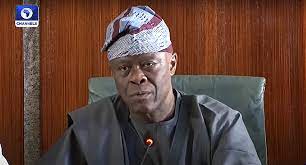
FG To Restart Direct Cash Transfers To 12m Nigerians
Resuming direct cash transfers to Nigeria's most vulnerable and impoverished citizens is the goal of the federal government.
Currently, these schemes serve about three million people, but the government estimates that 12 million more households may be eligible for these direct payments as a result of rising living expenses.
This idea was disclosed by Wale Edun, the Minister of Finance and Coordinating Minister for the Economy, during the Ministry's retreat in Uyo, Akwa-Ibom State.
The minister of finance declared, "The presidential panel on the social investment programmes is ready to present an internal recommendation to Mr. President in order to resume direct payments to the most vulnerable and impoverished individuals. To lessen the suffering, every effort is being made.
"We currently know of approximately three million beneficiaries, but with the rate increases, it's likely that another 12 million households could be eligible for that payment."
The minister stated that the goal of the direct cash transfer extension is to help more people who are struggling financially by reaching out to a larger population and giving more money to those who need it most so they can prioritise their needs and reduce poverty.
In order to keep the President updated on progress, the Panel decided to notify him of its decision before the final report was finished.
Technology, according to Edun, would be utilised to guarantee quick and transparent payments while minimising human procedures and hold-ups.
The sole thing, he stated delaying that is not waiting for the end of the report. It is something that the intervention is meant to happen immediately.
Our objective was to use technology to enable a smooth payment and movement between the registered and direct recipients, free from any manual processes in between. We have professionals in this area. In order to resume direct payment, it will take some time to automate that process.
The government is acting to lower costs and enhance food supply because it recognises the substantial impact that food prices have on household finances.
The minister restated the role of President Bola Tinubu in releasing 60,000 metric tonnes of food grains.
"The goal is to put food, feed, and the mill into the market in an effort to drive down food prices and increase food availability," he stated. That is currently the top priority on the government's financial and administrative fronts.
Edun defended the idea of giving the most vulnerable and impoverished members of society direct cash transfers, saying that "evidence and history have shown that when you pay someone directly, you put money in their hand." Because people choose where the shoe pinches the most, it lessens poverty.
Thus, it directly reduces poverty and offers a direct benefit. It relieves, and there's an agreement to get that process started right away. in order that as far as these interventions are concerned and the landscape which we as a team are facing, we have a commitment to help to bring down inflation”.
“Growing the economy, creating jobs and lifting millions and millions of Nigerians out of poverty, that’s the ultimate goal of President Bola Tinubu and his economic policies.”
The minister admitted that one cause of inflation in the past had been the reliance on "Ways and Means" finance. He stated that through a number of financial and revenue-generating efforts, the administration is committed to lowering this debt burden.
"Ways and Means have been identified on the financial side, and we both agree that the historical legacy of Ways and Means that was inherited has to be dealt with, and has to be paid out in one way or another," he said. And in order to relieve the economic burden of inflation, we are concentrating on financial engineering and revenue-generating projects.
According to Edun, combating inflation and stabilising the economy require close coordination between the Central Bank and the Ministry of Finance. To this end, the Central Bank is using various tools to achieve these goals, including stabilizing interest rates and managing foreign exchange rates.
As the minister put it, "It's a war, and the strategies shift when the naira loses value or when there's a need to rebuild trust in the naira as a store of wealth. And every toolkit, every weapon at hand, is being exposed and put to use. The central bank will undoubtedly prevail in this conflict. The government will prevail in this conflict. That is beyond question.





